In this week’s review of Court Judgments, we look at Kerala High Court’s judgment regarding denial of education loan in view of parents’ credit score, Karnataka High Court’s order in a case relating to the process of adoption of a child, Delhi High Court’s observation about eligibility to receive maintenance from in-laws and its order in a trademark infringement suit.
Kerala HC: Low CIBIL score of Co-Borrowers is not a ground to deny Education Loans
In the case of Kiran David vs. Assistant General Manager, SBI, Justice N. Nagaresh of Kerala High Court stated that CIBIL scores of Co-borrowers should not be criteria to deny education loans, as such conditions would defeat the very purpose of granting such loans. As per the case details, the petitioner Kiran David moved the Kerala High Court regarding the denial of an education loan by the Manager of State Bank of India citing that the co-applicants i.e., the parents did not have the requisite CIBIL scores.
Advocates representing the petitioner argued that as per RBI, an education loan is a futuristic loan and is aimed to provide financial support to deserving or meritorious students for pursuing higher education. They referred to an earlier case, Pranav S.R vs. The Branch Manager, SBI & Anr, in which it was observed that unsatisfactory credit scores of the applicant’s parents cannot be a criterion for rejection of loan since the repayment capacity of the applicant after the education ought to be the deciding factor.
However, the respondents i.e., SBI opposed this petition. They submitted that as per SBI educational loan policy, the loan would be sanctioned jointly in the name of students and their parents/guardians, who are considered co-borrowers of the loan. Hence the credit discipline of the parents also becomes a criterion. Various RBI circulars and SBI guidelines require the borrower/co-borrower not to have an adverse credit history.
However, the Court was of the opinion that these circulars & guidelines are not relevant to the provision of Educational Loans. The court further highlighted that Education is a priority sector as per Reserve Bank of India (Priority Sector Lending Targets and Classification) Directions, 2020.
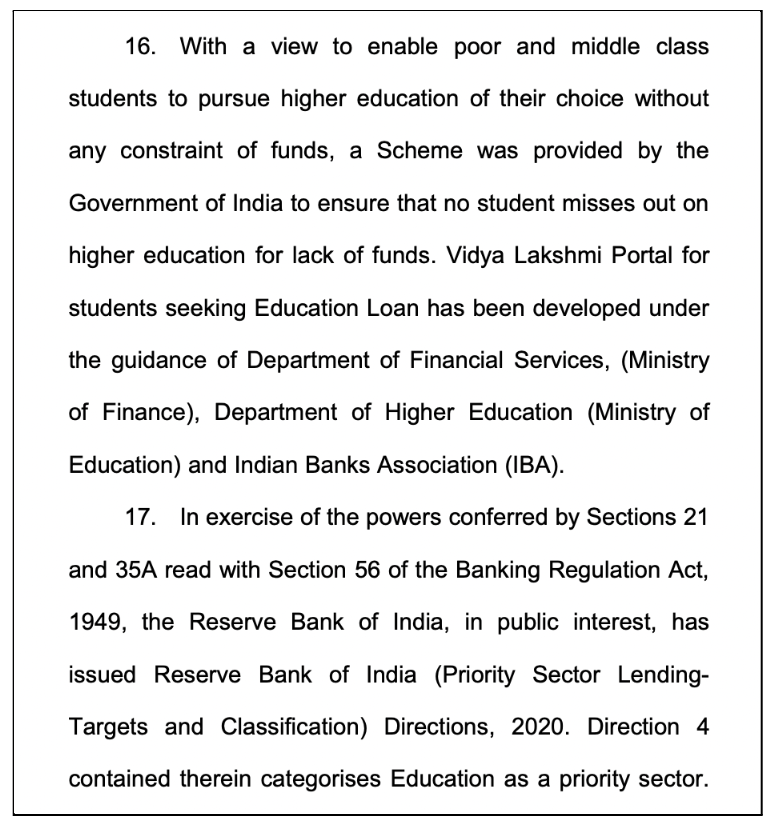
Hence, the court allowed the petition and directed the Bank to reconsider the loan application and sanction the loan if eligible, by disregarding the low credit score of the co-borrowers.
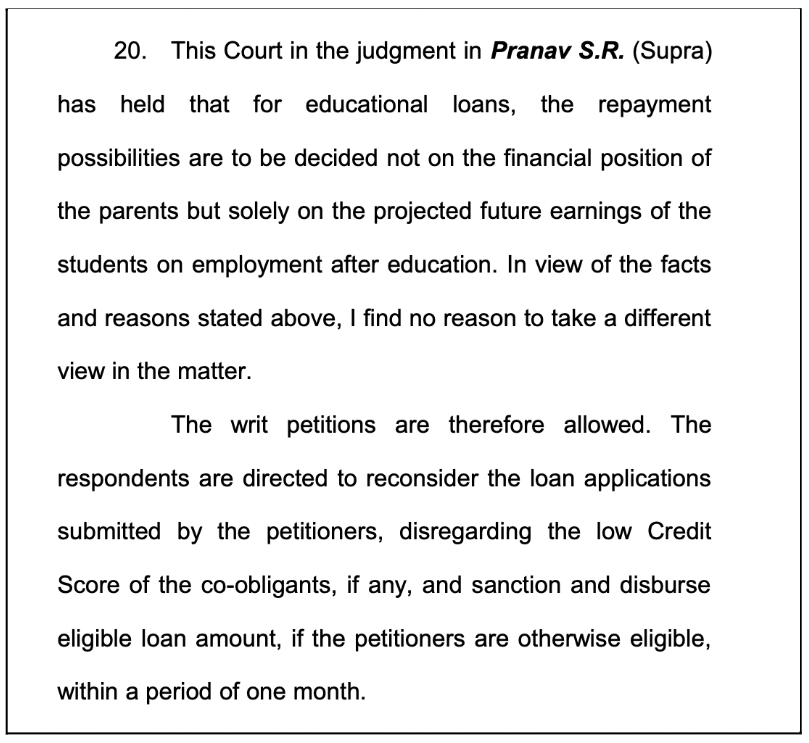
Delhi HC: Daughter-in-law can claim maintenance from her Father-in-law provided she inherited estate from her husband
Delhi High Court observed that the daughter-in-law can claim maintenance from her father-in-law in case she has inherited some estate from her husband. This court made this observation in the case Laxmi & Anr vs. Shyam Pratap & Anr.
The bench comprising of Justice Mukta Gupta & Justice Neena Bansal Krishna dismissed the plea filed by the appellant i.e., the widowed daughter-in-law & granddaughter since they did not disclose any information regarding any estate that they have inherited from the deceased husband i.e., son of the respondent.
The first appellant got married to the son of the respondents in December 2011 and a daughter was born in October 2012. The husband passed away in December 2013, post which the appellant and her daughter shifted to the parental house. After 4 years, she filed a petition for maintenance, claiming that she does not have any source of income to maintain her daughter while her father-in-law is employed and has the means to provide for maintenance.
The respondents i.e., the father-in-law and mother-in-law of the appellant contended that she did not return all these years after she left for her paternal home and also, she is not entitled to any maintenance under Section 19 of the Hindu Adoption and Maintenance Act, 1956 as the deceased has not left any estate.
The family court dismissed the application as the husband did not leave any estate behind from which maintenance can be claimed. This was challenged in the High Court. The claim in the High court from the petitioner was that they are entitled to claim maintenance from their father-in-law and were wrongly denied maintenance by the Family Court. The Court observed that Section 22 of the aforementioned Act provided for the maintenance of dependents of the deceased by the heirs of the deceased. However, it was subject to inheriting an estate from the deceased by the dependents.
In this case, the first respondent i.e., the father-in-law has expired and heirs i.e., the mother-in-law and Sister-in-law of the appellant have not received any estate from her husband from which the maintenance can be claimed.
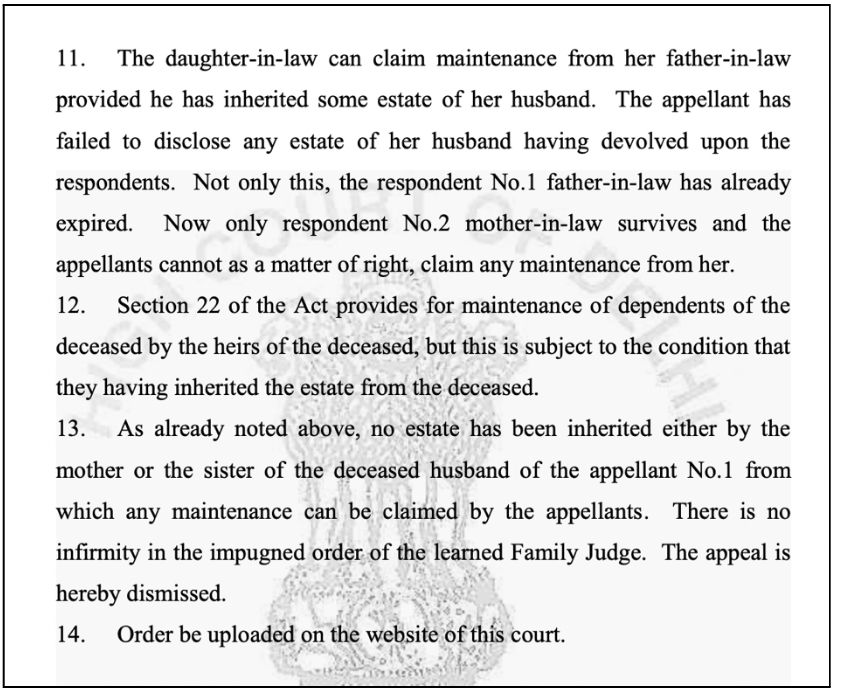
Karnataka HC: Adopting a child directly from biological parents is not an offence
A single-judge bench of Justice Hemant Chadangoudar stated that it is not an offence if the child is directly adopted from the biological parents and is not punishable under the provisions under Section 80 of the Juvenile Justice (Care and Protection of Children) Act 2015 (JJ Act).
In the case, Banu Begum W/O Khajasab alias Mehaboobsab & others vs. the State of Karnataka, the prosecution alleged that the third accused has adopted the daughter born to accused 1 & 2 without following the provisions or procedure prescribed under JJ Act and thus is punishable under Section 80 of the said Act.
Section 80 D provides punishment for adopting any orphan, abandoned or surrendered child without following the provisions mentioned in the JJ Act. The Magistrate took cognizance of the accusation and summoned the petitioners who approached the High Court.
The petitioner stated that the child is alleged to have been adopted by the accused and is not an orphaned, abandoned, or surrendered child and hence falls under the punishable offences of Section 80 of the JJ Act. Therefore, the charge sheet filed against the petitioners does not have a substance. The High court agreed with the petitioners and said that in the absence of a declaration that the child is deserted by the biological parents, filing a charge sheet is not substantial. The Judge allowed the petition filed by the two couples i.e. the biological and adoptive parents and quashed the proceedings initiated against them.
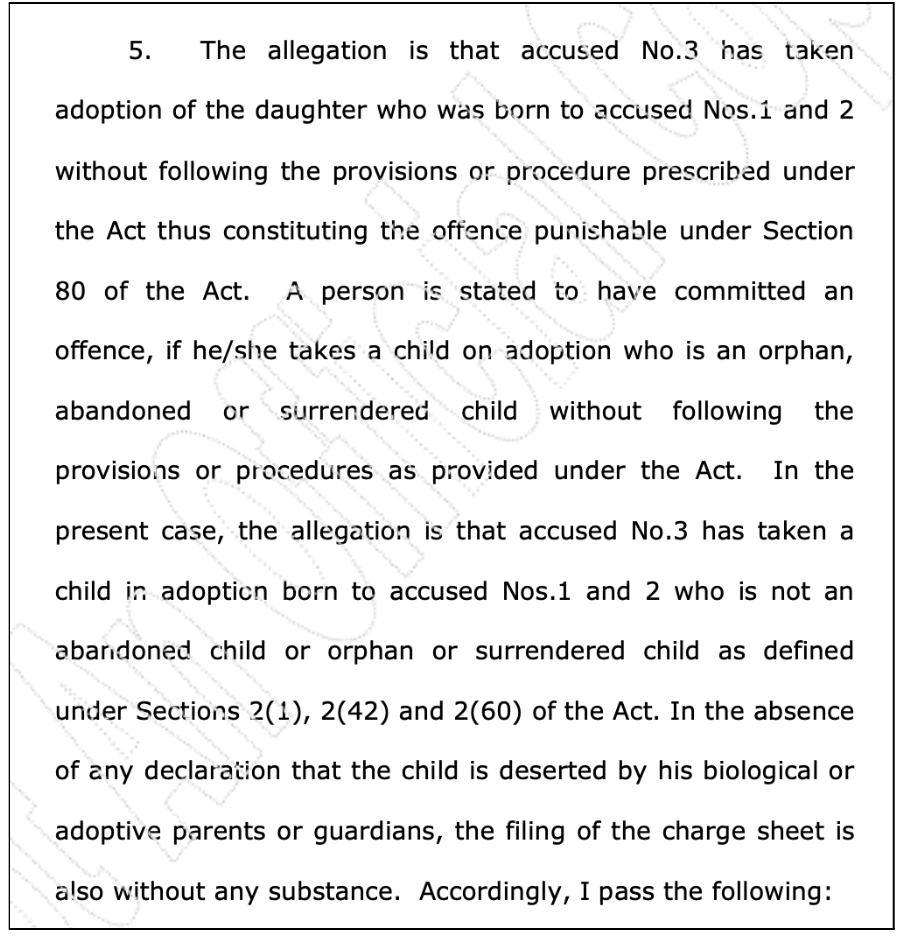
Delhi HC: Awards 2 lakhs in damages to Star Bucks in a Trademark Infringement Suit
Delhi High Court has awarded Rs. 2 lakhs in damages and Rs. 9.6 lakhs in favour of Starbucks Corporation in a trademark infringement suit. Starbucks filed a trademark infringement suit over the usage of its registered trademark “Frappuccino” against ‘TeaQuilla, A Fashion Café’ i.e., the defendant. Through the suit, it sought a decree of permanent injunction restraining the defendants from infringing on its trademark “Frappuccino” as a stand-alone word or in conjunction with others as a prefix or suffix.
Starbucks i.e., the plaintiff was using the trademark ‘Frappuccino’ for its popular cold beverages across the world in various flavours and the trademark is registered in over 185 countries. In view of the quality of the goods under the trademark and its international marketing activity, they have earned goodwill and reputation. The defendant in the case was operating a café under the name “Café TeaQuilla – A Fashion Café” and was selling beverages under the names “Butter Scotch Frappuccino” & “Hazelnut Frappuccino” without the permission, authorization, or license of Starbucks. These products were visually similar to the various flavours and products of Starbucks using “Frappuccino”.
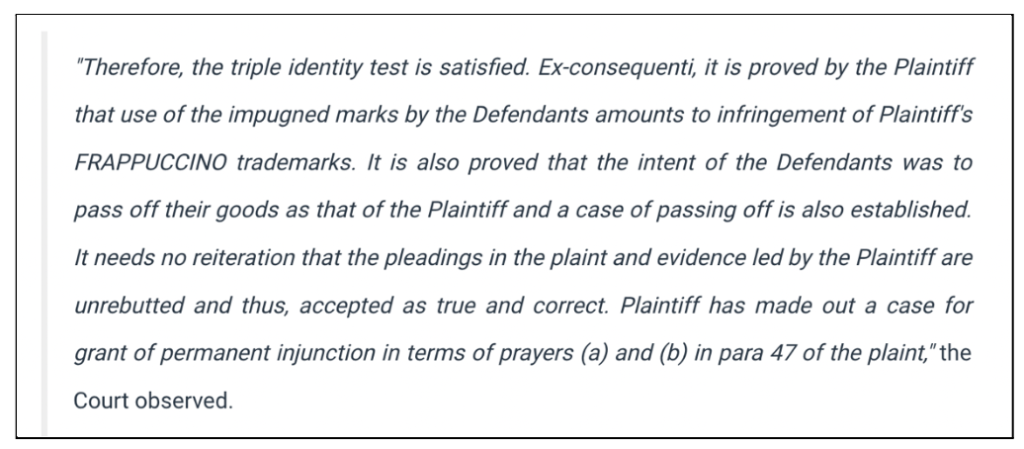
Through an earlier order in September 2019, the court has granted an interim injunction against the Defendants. The court observed that the defendant is found guilty of infringement and that it can grant notional damages accordingly. The Delhi High court awarded damages to the tune of Rs. 2 lakhs in the favour of Starbucks. It made a note of the Advocates fee certificate consisting of details of the cost incurred by Star backs towards lawyers & court fees which amounted to Rs. 9,60,100 and awarded this amount in favour of the plaintiff and against the defendants.
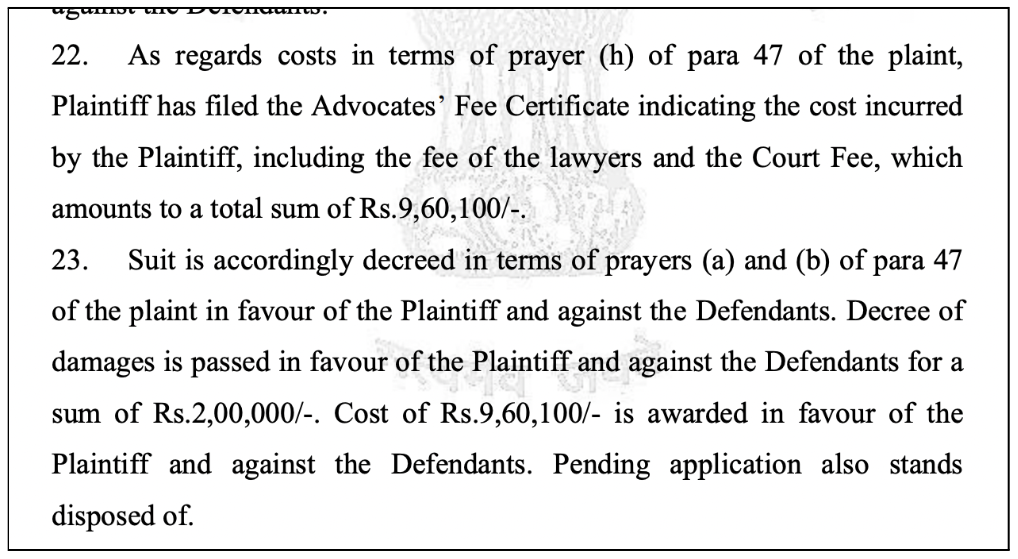
Featured Image: Review of Court Judgments


